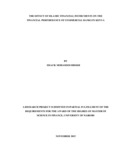| dc.description.abstract | Financial innovation is the life blood of any financial system and leads to introduction of improved systems, processes and products. Islamic Banking, as a financial innovation based on Islamic Shari‟ah has grown phenomenally in the world in the last 40 years and has emerged as a fast growing segment of Kenya‟s banking industry. The study sought to investigate the effect of Islamic banking product on the financial performance of commercial banks in Kenya. The study was based on Profit and loss sharing theory and Islam Islamic banking theory and theory of interest. The study used descriptive survey method to investigate effect of Islamic banking product on the financial performance of commercial banks in Kenya .The population of this study comprised seven commercial banks offering Islamic banking products in Kenya.
Secondary data was used in this study; specifically the study used financial statements the data was coded using SPSS (version 21). Descriptive statistics was used to summarize the data, this included the use of weighted means, standard deviation, SPSS (version 21) has descriptive statistics features that assisted in variable response comparison and gave clear indications of response frequencies. Pearson moment correlation was conducted to establish the linear relationship between study variables. Regression analysis was conducted to establish the nature of the relationship.
The study found a positive correlation between financial performance of IFIs and Islamic financial instruments which include Musharakah financing, Mudaraba financing, Murabaha financing and Ijara financing. The study established that quality of the assets and the financial performance of banks are strongly and positively correlated and that an increase in the quality of the assets would lead to significant growth in the financial performance of banks, the financial performance of the commercial banks in Kenya is highly dependent on the level of the institutions‟ liquidity. The study found strong positive correlation between financial performance of Islamic financial institutions and size bank as shown by correlation (coefficient factor 0. 767, P- value 0.003), bigger banks can cope better with changes and has better chances to offset random losses.
The study concludes that all the Islamic financial instruments had a positive impact on the performance of commercial Banks in Kenya, the quality of the assets, larger sized banks had a positive influence on the financial performance of Islamic banks in Kenya and that high levels liquidity had a negative impact on financial performance of commercial banks. The research recommends that Islamic financial institutions need to continue offering Islamic financial instruments as they were all found to positively influence the financial performance of Islamic banks. More investments should therefore be done through establishing more banking networks across the country which is associated positively with their financial performance and to facilitate favorable financial performance in Islamic banks in Kenya, there is need to formulate strategies to facilitate credible levels of liquidity. | en_US |

